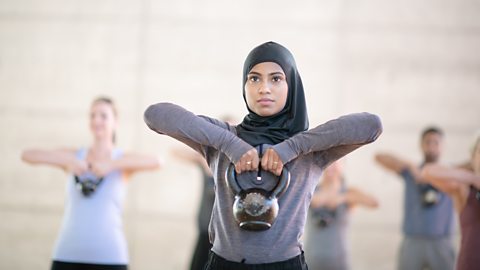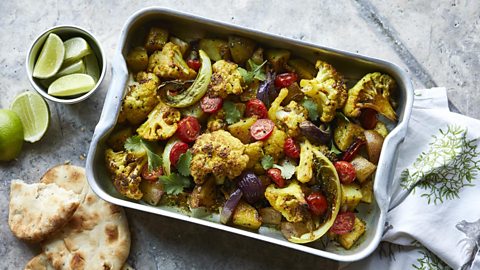Ramadan: how to fuel exercise while fasting
The Islamic holy month of fasting begins on the evening of 10 March 2024. If you’re wondering how to juggle exercise and nutrition during Ramadan, help is at hand.

Fasting during the day for Ramadan may mean your exercise routine needs some extra thought as your body adjusts and energy levels are disrupted.
This is something personal trainer Belal Hafeez and dietitian and nutritionist Nazima Qureshi are experts in. Known as The Healthy Muslims, this husband-and-wife team have even written a book on navigating food and exercise while fasting, called The Healthy Ramadan Guide.
“The goal of Ramadan is to increase your focus on prayer, spirituality and self-improvement – and to simply be more present in the month. What we're consuming and how we're exercising will play into that significantly because it has a huge impact on our stress levels, work-life balance and families,” says Hafeez.
If you're keen to stay healthy and build on your fitness throughout this 30-day fast, here are some things to keep in mind.
Stay hydrated

“Many people find they have headaches in the first few days of Ramadan – and that’s because of a lack of hydration, says Qureshi.
“The goal is to drink the same amount of water as you would when you’re not fasting. So, you need to split the water up into the small windows of time you have between dusk and dawn. A good way to start is to make sure you drink a litre in the morning. It will make you feel so much better.”
If you usually consume caffeinated drinks throughout the day, the need to keep hydrated becomes all the more important, as caffeine withdrawal is also known to cause headaches.
“The key is to start cutting down on coffee before Ramadan begins,” says Qureshi. Although, if you still find yourself with a sore head, staying properly hydrated can alleviate those symptoms of withdrawal.
Start the day right
“Because you’re going to be having two meals instead of three – iftar in the evening and suhoor before dawn – you’ll need to choose dishes that give you enough energy to function throughout the day,” says Hafeez.
“People think because they’re low on energy they should just catch up on sleep and skip the morning meal. But you need to get that nutrition in,” agrees Qureshi.
“Your morning meal should include a complex carbohydrate with some protein and healthy fats. And then if you can have some veggies or fruit too that would be a bonus.
“Overnight oats is something we often recommend because it has all of those components but isn’t a large amount of food to try and get through. In addition to the oats, I add Greek yoghurt for protein, chia seeds (which have healthy fats), fruit and milk.”
Mango lime lassi bircher
Nadiya Hussain's bircher includes lime and mint so will add a zing to suhoor

Overnight oats has another significant benefit too – because you prepare it the night before, you can sleep longer in the morning.
Qureshi does admit that eating so early can be tough if you’re not used to it, but says your body adapts relatively quickly. “If you find it hard for the first couple of days, just take a few bites of food to start getting used to it. Often, by the fourth or fifth day you'll actually start to be hungry at that time.”
Avoid overeating in the evening
Because you’ve been fasting all day, the temptation can be to ‘make up’ for it in the evening, especially if you’re breaking your fast with family and friends, says Hafeez. “Opening your fast is a joyous time – it is a time when people come together. But the food that lots of people are consuming during iftar is so dense in calories that's easy to overdo it.
“An example could be samosas. They tend to be at least 250 calories each. And nobody has one – you’ll have two or three, just to begin your meal. That means you can easily surpass the number of calories you would ordinarily have.
“If you were doing this once every weekend that's probably fine, but this is likely every single day for a whole month. So, while you are technically fasting, you’re actually consuming much more food than you would any other time of the year.”
Qureshi adds, “It’s going to leave you feeling like you have very low energy and start leaching into the next day’s fast, where you just don't feel that great.
“What we recommend is that when you break your fast, open with water, dates and some fruit, then go do your prayer before having your meal. Incorporate your cultural foods but make sure you're having some protein, complex carbs and veggies, perhaps in the form of soups and stews or meals of chicken, kebabs and fish.”
Slow down and stay balanced
If you’re sharing your meal with others there can – as with any gathering of family or friends – be a social pressure to eat everything offer. But there are a few tricks this couple use to help themselves stay on track.
Hafeez says, “The biggest thing that we tell people is to slow down when eating. Take your time, have more conversations. If your host notices you sitting there with an empty plate while everyone else is eating, they’ll likely encourage tell you to take more. So slow down and then there won’t be that pressure.”
If they're attending a gathering hosted by someone else, they also bring a dish and make sure it’s one that will add to the nutrition on offer. “We’re that couple that brings a salad!” jokes Hafeez.
Spiced aloo gobi traybake
When breaking your fast in the evening think about what nutrients your meal will give you

“I know vegetables are never the most popular option, but the reality is there will already be protein and carbohydrates on the table,” says Qureshi. “It’s not a case of going in and saying, ‘we’re not going to eat your food, we’re only eating ours’, it’s just adding to what’s on offer.”
Exercise at a time that works for you
“Most people will work out an hour or two before breaking their fast because then when they finish, they'll get to have food and water soon after,” says Hafeez.
“However, if that’s not going to work with your schedule, stick to your usual routine. Last year I enjoyed working out in the early afternoon – I noticed my energy went through the roof for the rest of the day. The first workout can be a little bit tough, but our bodies are resilient and adjust very quickly to be able to manage.
“Alternatively, you could work out once you’ve broken your fast but, because there’s a night prayer within that time frame, it can be hard to fit it in.”
Concentrate on strength and stability

Regardless of what time of day you choose to exercise, it’s important to adapt your activity.
“Pull back on the intensity of your workouts during Ramadan,” says Hafeez. “Take this month to focus more on movement, mobility, your core strength and building stability. From your shoulder joints to your hips and even your ankles – just focus on becoming more functional.
“Of course, it’s important to get a good night’s sleep too if you’re keen to maintain your fitness levels.
“Think of a bow and arrow: what you're trying to do during Ramadan is pull the bow back. Then, if you’ve built a solid foundation in those 30 days, you'll notice how much further the arrow travels when you let go.”
These less intense exercises are also ideal if you don’t have an established routine but are trying to improve your fitness levels. This month is perhaps not the time to kick off an intensive gym habit says Hafeez – getting out for walks is a great place to begin instead.
Focus on your intention
If you find yourself struggling for energy during Ramadan, Hafeez says to circle back to the purpose of the fast.
“It’s deeper than simply just fasting for the sake of fasting. There's a level of spirituality that's really important. It's about connecting back to our tradition.
“A level of toughness is required – it's supposed to help us become stronger and improve. When those moments of struggle come, remind yourself it's OK to feel that way, and that it's only 30 days. For me, it helps build a level of resilience.”
Originally published March 2023